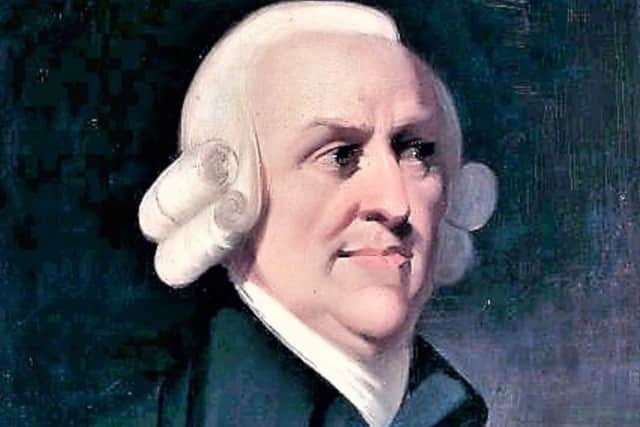How Extinction Rebellion owes a debt to Adam Smith – Bill Jamieson


Do these Extinction Rebellion demos win sympathy, or repel? City centre streets blocked, travel brought to a halt, hospital entrances besieged, protestors made up as clowns (yet want to be taken seriously), a fire engine brought in to hose the Treasury ending up as a comedy farce with the hose squirting red dye over the protestors. Police stations filled with 600 obstructing demonstrators arrested in a deliberate drive to clog the system.
The protests have a hysterical, ominously cultish air, with impossible demands for zero carbon in five years. Is this the way to win support?
Advertisement
Hide AdAdvertisement
Hide AdBut look again. Have these protests not succeeded in gaining massive media attention that would not have been captured by conventional protest? Have they not worked to encourage political parties to up their green credentials, the Government to boost ‘green’ programmes, supermarkets to phase out plastic bags, housebuilders to push on with low-carbon technology, and major national arts companies in recent weeks to drop corporate sponsorship from oil giants Shell and BP?


Might obstruction and confrontation work? But hey, what a hypocrite I am. Did I not in my youth join an anti-nuclear sit-in demo at Faslane? Clamber over an exposed once-secret Regional Seat of Government nuclear hideaway? And defiantly stand before police horses in the riotous 1968 anti-Vietnam war protest outside the American Embassy in Grosvenor Square?
Guilty as charged, M’lud. But regrets? None.
It’s not because I have remained a radical. For there is much in the climate change protest that appeals to the conservative instinct: the preservation of our planet, the protection of plant and species, a check on landscape destruction and unfettered globalisation, chronic car congestion and that greater diffuse but deadly loss of heritage, memory, constraint and personal responsibility.
I have sympathy with the underlying aims of Extinction Rebellion, not because I am anti-capitalist but because I believe that our relatively open market economy, for all its warts and excesses, has survived constant prophecies of Marxist collapse by adaptation and responsiveness to change. In this, the climate change movement is a wholly legitimate and necessary player.
It puts pressure on governments, businesses and individuals to act. And that action is driven by an awareness – as Adam Smith so brilliantly set out – of our own self-interest.
Ethical investment funds
In the past ten years, city institutions have invested more than £2 trillion in green energy. To keep in step with changes in customer behaviour and preferences, corporate action to promote sustainability and improve social responsibility is increasingly evident.
House-building technology has been transformed in recent years with low-carbon homes. In finance, dozens of ethical and ‘socially responsible’ investment funds, a rarity a decade ago, jostle for private investor support.
Behaviour change matters. And for that alone, the underlying aims of Extinction Rebellion deserve respect. But for its goals to be realised, this requires a greater realism and nuance.
Advertisement
Hide AdAdvertisement
Hide AdGovernment regulation and higher taxes alone will not fix this – and certainly not dramatically shortened targets whose fulfilment would critically damage the economy and impose severe restrictions and penalties for those less well off.
Zero carbon in five years can only be achieved by reducing energy consumption by over 80 per cent. Some 30 per cent of energy consumption is domestic, an equal percentage is used in transport. In such a timescale, how do we get to work, or deliver food to cities?
Yet corporate behaviour in the energy sector can make a massive contribution and further change needs to be encouraged. Investor pressure, consumer attitudes and governments’ climate change policies are all driving big oil’s transformation. These, and increasingly so today, technology advance, hold the critical key.
BP getting into renewables
Take oil company BP. It has taken a 43 per cent stake in solar power business Lightsource BP and plans to invest $200m over three years to develop substantial solar capacity around the world and advance low-carbon across energy markets.
It has already doubled the number of countries where it has a presence since December 2017. It is working to bring 25MW of locally generated solar power to western US, through new collaborations in California and New Mexico.
Elsewhere it is working on renewable power projects in the UK, Australia, Brazil (ethanol fuel), Europe, Egypt and India. It also has significant interests in US onshore wind energy, operating ten sites, with a net generating capacity of just over 1,000MW.
Not enough. Not nearly enough – but it is the pronounced direction of travel and not lightly to be dismissed as ‘greenwash’. Royal Dutch Shell has been moving in a similar direction.
How much better it would have been had the National Theatre and the Royal Shakespeare Company proposed to the energy giants that they would welcome sponsorship from those subsidiaries and affiliates directly involved in solar power and low-carbon tech, and extending discounts and promotions to their frontline staff?
Advertisement
Hide AdAdvertisement
Hide AdI suspect most theatregoers would approve of this nuanced approach and corporate sponsorship of our great arts institutions and their out-reach and new talent programmes would be sustained.
Corporate sponsorship was running at some £114 m a year at the last count. Our own Scottish Opera derives 9.1 per cent of its income from fundraising – the same percentage as derived from box office takings.
Street protest can only take us so far. Extinction Rebellion has to be more than bizarre displays and a platform for virtue-signalling by celebs. It needs to drop the infantilism and widen, not close, those broader roads to real and effective change.
